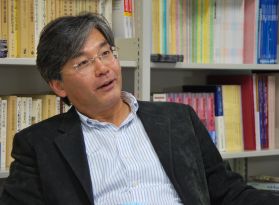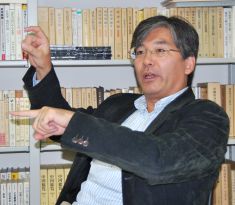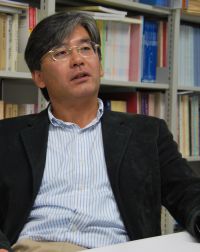Faculty Interview 02
Sonoda Shigeto (Professor)

―― What are some of your present research interests?
I have been studying in the field of sociology, and my interest lies particularly in the regions of China and Asia. However, the specific theme with which I tackle tends to be contingent, since I have a habit of thinking as the project rolls. This is because projects oftentimes proceed in unexpected directions or against our intentions.
For example, one of the projects that I am presently involved in is the “Asia Barometer Project”. This is a project launched by Professor Inoguchi Takashi in 2003, when he was at our Institute. I was extremely excited to learn that he had begun collecting data related to social life in Asian regions where there had been no reliable dataset till then. I therefore wanted to participate in the project, and to this day, have not been able to “slip out” of it (laugh). Indeed, we are expecting to see some meaningful discoveries through the use of data from more than thirty countries in Asia.
―― What are some specific examples of “meaningful discovery”?
For instance, we have been looking at how globalization has proceeded in Asia. Therein, we discovered that one’s knowledge of English and educational achievement is becoming closely correlated to his/her social position. In regions like Japan, Korea, and China, which were never colonized by Anglo-American countries, ability or education in English had very little to do with one’s income, but the two have gradually become interconnected in the recent years. In this way, globalization does not refer simply to the wider use of English, but also to the change of social structure due to increase in those who use English in regions in which the language had not been widely used. This is one typical case where I achieved an exciting result by participating in a project that I had not designed.
There are many other cases in which I encountered “meaningful discoveries” by leading a project. In the city of Tianjin, China, for example, we have been carrying out a fixed point investigation based on a sample of 1,000 people annually. We began this investigation in 1997, and when we look at the pay differentials between 1997 and 2009, we can say that one’s educational background is a decisive factor. In particular, after 2005, average earnings of college graduates have been rising whereas those of all others have not risen as much.
While there has been an increase in those who respond that “lifestyle has improved” with the rapid economic growth, the number of those who feel that they “belong to the lower class within the society as a whole” have also increased. Such a change cannot be found unless we carry out the investigation at the same location at regular intervals.

I went to China for the first time in 1984, when I was in my first year of graduate school. If you ask if China was an important place for me at that time, I would say it was not necessarily so. I was interested in the country, but did not think that it would be the subject of my research. If my advisor, Prof. Tominaga, had not had the opportunity to teach in China—and if I had not had the opportunity to go to China with him—I would never have chosen to specialize in China.
However, having gone to China, I realized that she is different from Japan in many ways. When I began thinking why there are so many differences, and whether sociology had been rightfully explaining China, I became aware that there was a significantly big question that had never been asked. It is no exaggeration to say that my volition to answer this question that came to my mind then as a Master’s student is what has made what I am today.
―― Do you feel that you now have been able to organize your thoughts that you only vaguely had at the time you were writing your Master’s thesis?
Yes, I think so. I said earlier that I was interested in the differences between Japan and China. However, I did not intend my research to be based on simple comparative cultural studies. I felt that it was necessary to observe how these two countries have been transformed within the context of specific social changes that were taking place. It was only in 1991, when I carried out a research on Japanese companies in Asia, that I set to work. I carried out a research on how Japanese companies and Japanese people were perceived by local employees, a total of 11, 000 people in five societies of Asia (China, Taiwan, Thailand, Malaysia, and Indonesia). In 2006, I led a project to observe changes that took place over the fifteen years.
Next year, I plan to carry out a research in the Yellow River area from Shanghai to Jiang-su province, where one can find many Japanese companies, and in the Northeast region, focusing particularly on Dalian. I will thereby investigate what changes took place during the past ten years, and how much localization had been achieved by the companies.
During this period, not only the companies, but the society itself has gone through changes, and China’s relationship with the foreign countries has also changed drastically. The Chinese people have become more internationally-minded, and their views toward Japanese companies have begun to change. I would like to examine from a comparative perspective how not only the Japanese companies but also Korean and Taiwanese companies have adapted to such changes.

―― Lastly, could you tell us about your future prospects?
At this point, I am most interested in the possibility of creating a collective intellectual identity within the region of Asia.
In courses on the history of sociology that are taught at universities around the world, there is almost no reference to Asian sociologists. While sociology is taught in Japan, our contributions are not recognized internationally, and our names do not appear in the history of the discipline. However, we too are studying sociology, and there must be substantial intellectual achievements that we have accomplished thus far. Therefore, I would like to focus on Asia from a larger perspective to better explain our own society and the intellectual achievements that we have accumulated in order for it to be more widely recognized. Instead of making nationalistic statements, I wish to seek for more nuanced understandings of the similarities and differences among the various societies in Asia.
In 2014, the World Sociology Conference will be held in Japan, and this is the first time for it to be held in an East Asian country. I believe that the Japanese sociologists, together with sociologists from other Asian countries, should endeavor to respond to the big question, “What was sociology for Asia?”
Asian societies are sometimes categorized as one, but each country has its uniqueness. Nevertheless, the theories or concepts in sociology that can explain such individuality are yet immature. I want to continue our intellectual challenges that can respond to such questions, and make my own contributions in one way or the other.

